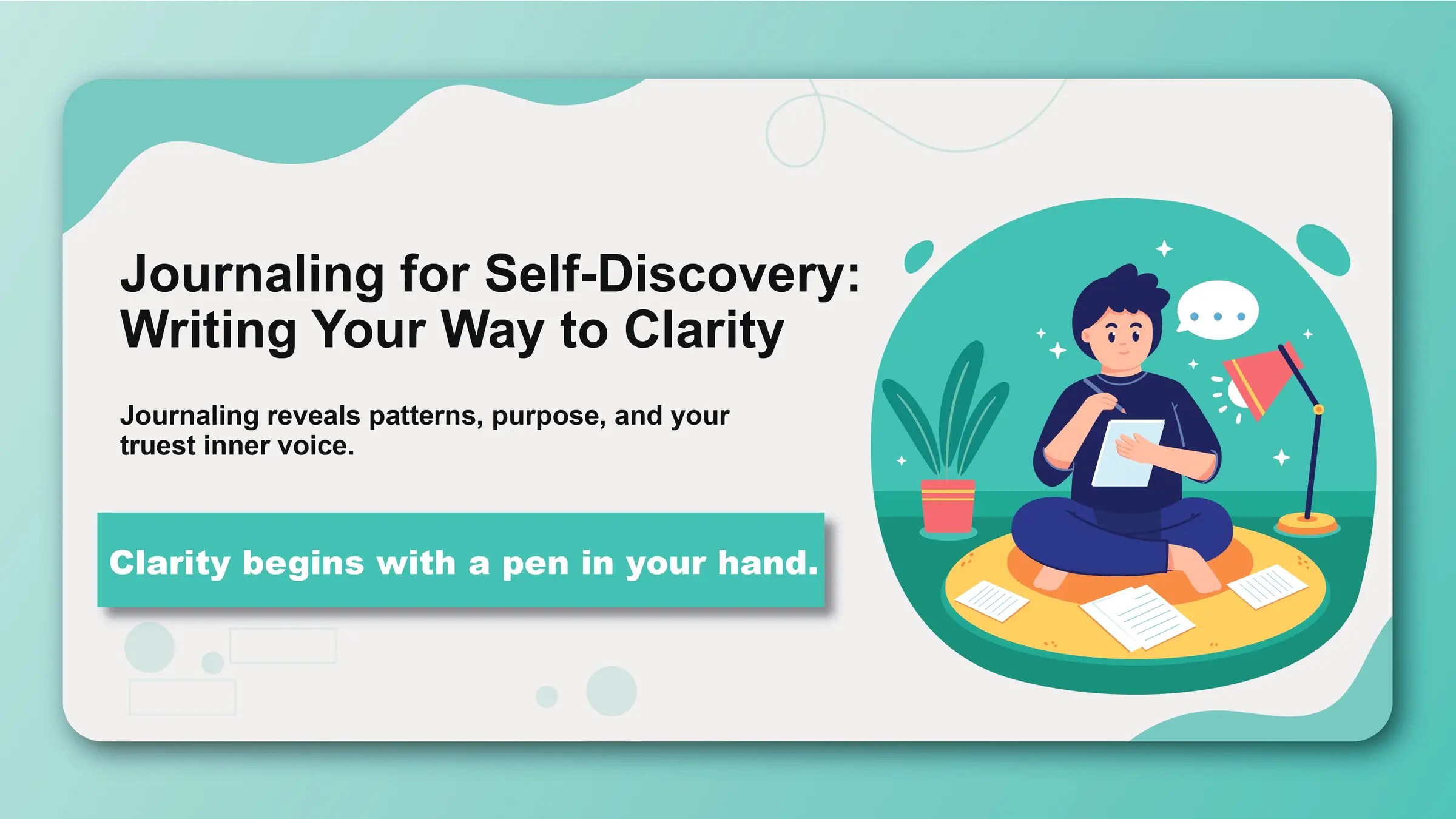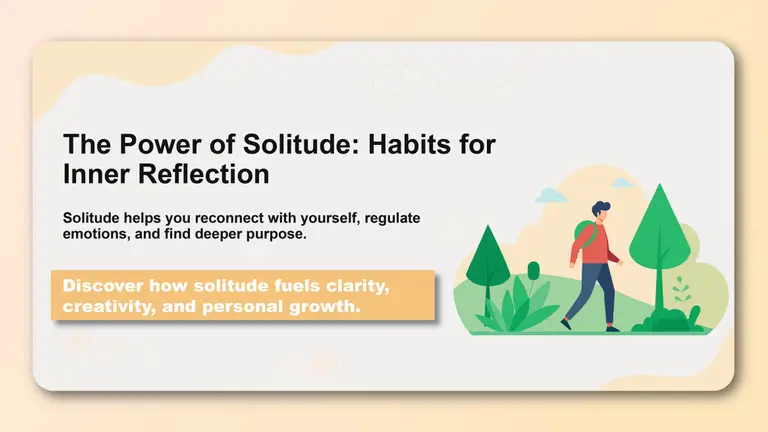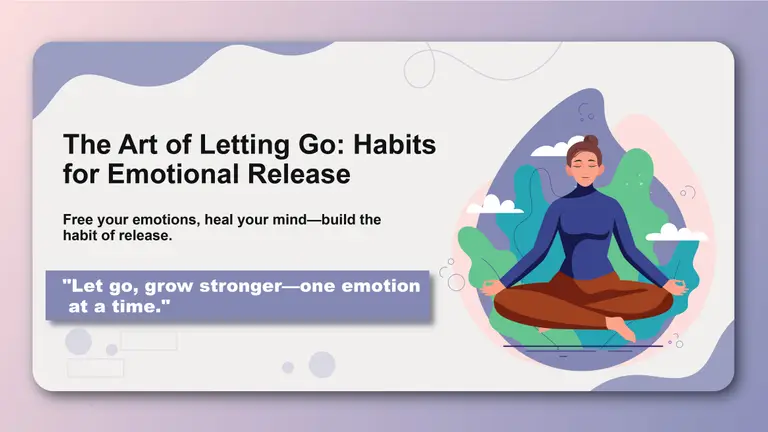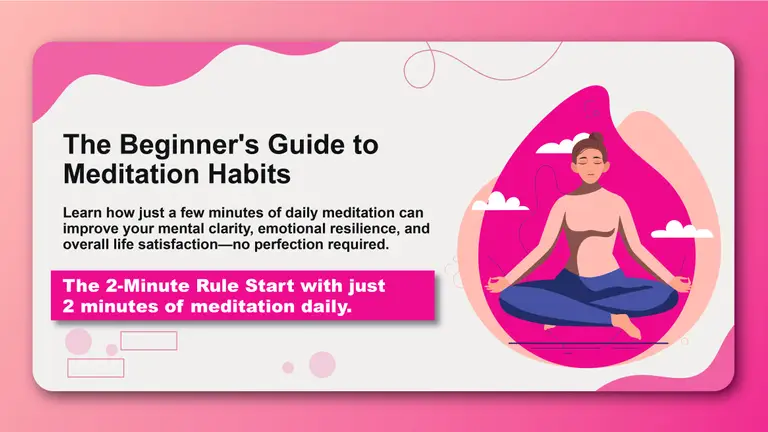Journaling is one of the most powerful tools for self-discovery and personal growth available to you. It's a practice that costs nothing but time and requires no special skills beyond the ability to write or type. Yet within those simple parameters lies a profound opportunity to understand yourself more deeply, process your experiences, and create clarity in your life.
The act of writing engages both your logical and creative minds, helping you organize thoughts that might otherwise remain jumbled or unconscious. When you put pen to paper (or fingers to keyboard), you're not just recording events—you're creating a dialogue with yourself that can reveal patterns, insights, and truths that might otherwise remain hidden.
Many people think journaling is just about recording daily events or venting emotions, but it can be so much more. Journaling for self-discovery is an active process of exploration and growth. It's about asking yourself meaningful questions, examining your beliefs and assumptions, and creating space for new perspectives to emerge.
The beauty of journaling lies in its complete privacy and freedom. There are no rules to follow, no right or wrong way to do it, and no judgment from others. This freedom creates a safe space where you can be completely honest with yourself, explore difficult emotions, and work through challenges without external pressure or expectations.
Regular journaling practice can help you identify patterns in your behavior, understand your emotional responses, clarify your values and priorities, and gain insights into your relationships and career. It serves as both a mirror and a compass—reflecting who you are while pointing toward who you want to become.
The Science of Journaling
Psychological Benefits
Emotional Processing Writing about emotional experiences helps you process and integrate them more effectively than just thinking about them. The act of putting feelings into words activates different parts of your brain and creates distance from intense emotions.
Stress Reduction Regular journaling has been shown to reduce stress hormones like cortisol and improve immune function. The practice helps you organize thoughts and gain perspective on stressful situations.
Improved Mental Health Studies show that expressive writing can reduce symptoms of depression and anxiety, improve mood, and increase overall psychological well-being.
Enhanced Self-Awareness Journaling increases self-awareness by encouraging reflection on your thoughts, feelings, and behaviors. This awareness is the foundation for personal growth and positive change.
Cognitive Benefits
Memory Enhancement Writing about experiences helps consolidate memories and makes them easier to recall. The act of writing engages multiple senses and creates stronger neural pathways.
Problem-Solving Skills Journaling helps you work through problems systematically, consider different perspectives, and generate creative solutions. Writing externalizes the problem-solving process.
Clarity and Organization The process of writing forces you to organize your thoughts and create coherent narratives from complex experiences. This organization extends beyond the journal into clearer thinking generally.
Goal Achievement People who write about their goals are more likely to achieve them. Journaling helps clarify what you want and creates accountability for taking action.
Types of Journaling for Self-Discovery
Stream of Consciousness Writing
This is free-form writing where you write continuously without stopping to edit or censor yourself.
How to Practice:
- Set a timer for 10-20 minutes
- Write continuously without stopping
- Don't worry about grammar, spelling, or making sense
- If you get stuck, write "I'm stuck" until new thoughts emerge
- Don't read what you've written until you're done
Benefits: Bypasses your inner critic, accesses unconscious thoughts, reduces mental clutter
Best For: Getting unstuck, processing overwhelming emotions, accessing creativity
Reflective Journaling
This involves thoughtful reflection on specific experiences, relationships, or aspects of your life.
How to Practice:
- Choose a specific topic or experience to explore
- Write about what happened, how you felt, and what you learned
- Ask yourself deeper questions about the experience
- Consider different perspectives and interpretations
- End with insights or actions you want to take
Benefits: Deepens understanding, processes experiences, identifies patterns
Best For: Learning from experiences, improving relationships, personal growth
Gratitude Journaling
A practice focused on identifying and appreciating positive aspects of your life.
How to Practice:
- Write 3-5 things you're grateful for each day
- Be specific and include why you're grateful
- Notice patterns in what you appreciate
- Include both big and small things
- Reflect on how gratitude affects your mood and perspective
Benefits: Increases positivity, improves mood, shifts focus from problems to blessings
Best For: Combating negativity, improving mental health, building resilience
Question-Based Journaling
This involves exploring specific questions designed to promote self-discovery and growth.
How to Practice:
- Choose a meaningful question or prompt
- Write your initial response without censoring
- Dig deeper with follow-up questions
- Challenge your first assumptions
- Explore different angles and perspectives
Benefits: Targeted self-exploration, systematic growth, deeper insights
Best For: Focused self-discovery, working through specific issues, goal setting
Powerful Journaling Prompts for Self-Discovery
Understanding Your Values
Core Values Exploration:
- What principles do I never want to compromise?
- When have I felt most proud of myself and why?
- What makes me feel most alive and energized?
- What do I want to be remembered for?
- What would I do if I couldn't fail?
Values in Action:
- How do my daily actions reflect my stated values?
- Where do I see conflicts between my values and my behavior?
- What changes would I make if I lived more aligned with my values?
- Which of my values have changed over time and why?
Exploring Your Relationships
Relationship Patterns:
- What patterns do I notice in my relationships?
- How do I contribute to relationship challenges?
- What do I need from others to feel supported?
- Where do I put up walls or defenses?
- How do I show love and appreciation?
Relationship Growth:
- What relationship skills do I want to develop?
- How can I be more present in my relationships?
- What boundaries do I need to set or maintain?
- How do I handle conflict and what could I improve?
Career and Purpose
Professional Reflection:
- What aspects of my work bring me the most satisfaction?
- What would I do if money weren't a factor?
- How do I want to contribute to the world?
- What skills do I want to develop?
- What does success mean to me?
Purpose Exploration:
- What problems do I feel called to solve?
- When do I feel most useful and capable?
- What legacy do I want to leave?
- How can I use my unique strengths to serve others?
Personal Growth
Self-Awareness:
- What are my greatest strengths and how do I use them?
- What patterns of behavior do I want to change?
- What fears are holding me back?
- How do I handle stress and difficult emotions?
- What brings me joy and how can I include more of it?
Growth Challenges:
- What comfort zones do I need to step out of?
- What would I attempt if I were braver?
- How do I respond to failure and setbacks?
- What do I need to forgive myself for?
- How have I grown in the past year?
Building a Sustainable Journaling Practice
Getting Started
Choose Your Medium
- Paper journal for a tactile, disconnected experience
- Digital journal for easy searching and portability
- Voice recording if you prefer speaking to writing
- Apps that provide prompts and structure
Set Realistic Expectations
- Start with 5-10 minutes per day
- Focus on consistency over perfection
- Don't worry about writing quality or grammar
- Remember that some days will be harder than others
Create a Routine
- Choose a consistent time (morning for reflection, evening for processing)
- Find a comfortable, private space
- Link journaling to an existing habit
- Have your materials easily accessible
Habit Formation Strategies
The Two-Minute Rule Start with just two minutes of writing per day. This removes the barrier of time commitment while establishing the routine.
Habit Stacking Link journaling to an existing habit:
- "After I have my morning coffee, I will write for 5 minutes"
- "Before I go to bed, I will reflect on my day"
- "After I meditate, I will journal about my experience"
Environmental Design
- Keep your journal in a visible location
- Create a comfortable writing space
- Remove barriers (have pens available, apps downloaded)
- Use visual cues to remind yourself to write
Overcoming Common Obstacles
"I Don't Know What to Write"
- Start with "I don't know what to write" and keep going
- Use prompts to get started
- Write about your day, even if it seems mundane
- Describe your current environment and how you feel
"I Don't Have Time"
- Start with just 2-3 minutes
- Use voice recording while commuting
- Write during lunch breaks or waiting periods
- Remember that journaling can save time by providing clarity
"I'm Worried Someone Will Read It"
- Keep your journal private and secure
- Use initials or codes for sensitive topics
- Focus on the process rather than the product
- Remember that privacy allows for complete honesty
"I Don't See Any Benefits"
- Be patient—benefits accumulate over time
- Try different types of journaling to find what works
- Focus on the process rather than expecting immediate results
- Consider reviewing old entries to see patterns and growth
Advanced Journaling Techniques
Dialogue Journaling
This involves writing conversations between different aspects of yourself or with other people.
How to Practice:
- Identify two perspectives or voices (your rational self vs. emotional self, or yourself vs. someone else)
- Write a dialogue between these voices
- Let each voice express their viewpoint fully
- Look for common ground or integration
- End with insights or resolutions
Benefits: Integrates different perspectives, resolves inner conflicts, improves empathy
Letter Writing
Writing letters to yourself or others (that you may or may not send).
Types of Letters:
- Letter to your future self
- Letter to your past self
- Letter to someone you need to forgive
- Letter to someone you want to thank
- Letter from your ideal self to your current self
Benefits: Provides perspective, processes emotions, clarifies communication
Timeline Journaling
This involves writing about your life from different time perspectives.
Approaches:
- Write about your day from the perspective of your future self
- Imagine how you'll view current challenges in 10 years
- Write about what you learned from past experiences
- Create a timeline of important life events and their meanings
Benefits: Provides perspective, reduces current stress, clarifies values
Dream Journaling
Recording and exploring your dreams for self-discovery.
How to Practice:
- Keep a journal next to your bed
- Write immediately upon waking
- Record as much detail as possible
- Look for patterns and recurring themes
- Explore what dreams might represent
Benefits: Accesses unconscious material, provides creative insights, processes daily experiences
Using Journaling for Specific Goals
Processing Difficult Emotions
Anger Processing:
- Write about what triggered the anger
- Explore what need or value was threatened
- Consider different perspectives on the situation
- Identify constructive actions you can take
Anxiety Management:
- Write about specific worries and concerns
- Separate realistic concerns from unlikely scenarios
- Identify what is and isn't within your control
- Create action plans for manageable concerns
Grief and Loss:
- Write letters to what or whom you've lost
- Explore memories and their meanings
- Allow yourself to express difficult emotions
- Identify sources of support and healing
Decision Making
The Pro/Con Plus Method:
- List pros and cons of each option
- Explore your feelings about each pro and con
- Consider your values and priorities
- Imagine yourself five years from now looking back
- Write about your intuitive response
Values-Based Decision Making:
- Identify which option aligns best with your core values
- Consider long-term vs. short-term consequences
- Explore potential regrets for each choice
- Write about what success would look like for each option
Goal Setting and Achievement
Vision Journaling:
- Write detailed descriptions of your ideal future
- Explore what achieving your goals would feel like
- Identify obstacles and how to overcome them
- Break large goals into smaller, manageable steps
Progress Tracking:
- Regularly review your goals and progress
- Write about challenges and how you overcame them
- Celebrate successes and learn from setbacks
- Adjust goals based on new insights and changing priorities
Creating Depth in Your Practice
Regular Review and Reflection
Weekly Reviews:
- Read through the week's entries
- Identify patterns, themes, and insights
- Notice changes in your mood, perspective, or behavior
- Set intentions for the coming week
Monthly Deep Dives:
- Choose significant entries to explore further
- Look for long-term patterns and growth
- Assess progress toward your goals
- Identify areas for focused attention
Annual Reflections:
- Review the year's journey through your journal
- Identify major themes and transformations
- Celebrate growth and acknowledge challenges
- Set intentions and goals for the coming year
Expanding Your Practice
Multi-Modal Journaling:
- Include sketches, doodles, or mind maps
- Add photos or mementos to physical journals
- Use different colors for different emotions or topics
- Experiment with poetry, lists, or creative formats
Themed Journaling:
- Dedicate periods to specific topics (relationships, career, health)
- Use seasonal themes for reflection
- Create special practices for transitions or challenges
- Develop your own unique journaling traditions
Journaling for self-discovery is a practice that grows richer and more valuable over time. As you develop consistency and explore different techniques, you'll find that your journal becomes not just a record of your thoughts and experiences, but a powerful tool for understanding yourself and creating positive change in your life.
Remember that there's no right or wrong way to journal—the best practice is the one you'll actually maintain. Start simple, be consistent, and allow your practice to evolve naturally as you discover what works best for you. The insights and clarity you gain through regular journaling will extend far beyond the pages of your journal into every aspect of your life.
Your journal is a safe space for complete honesty, creative exploration, and deep reflection. Use it to process your experiences, explore your dreams, work through challenges, and celebrate your growth. Over time, you'll develop a deeper relationship with yourself and a clearer vision of who you want to become.
Ready to start your journaling journey and unlock deeper self-awareness? Track your journaling habit and build consistent self-discovery practices with Habityzer and discover how this simple yet powerful practice can transform your understanding of yourself and your path forward.



